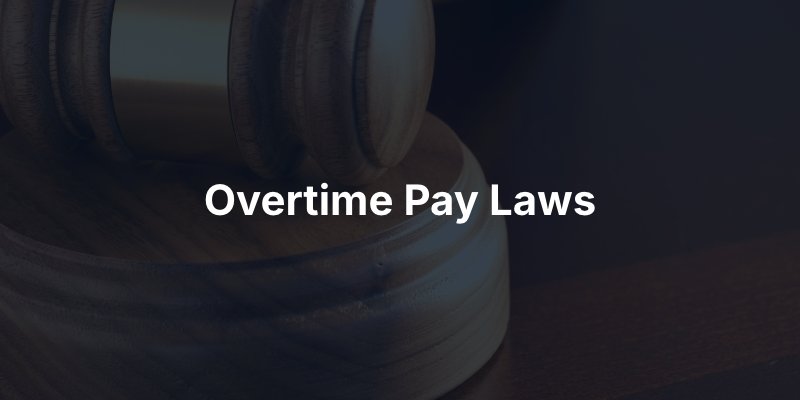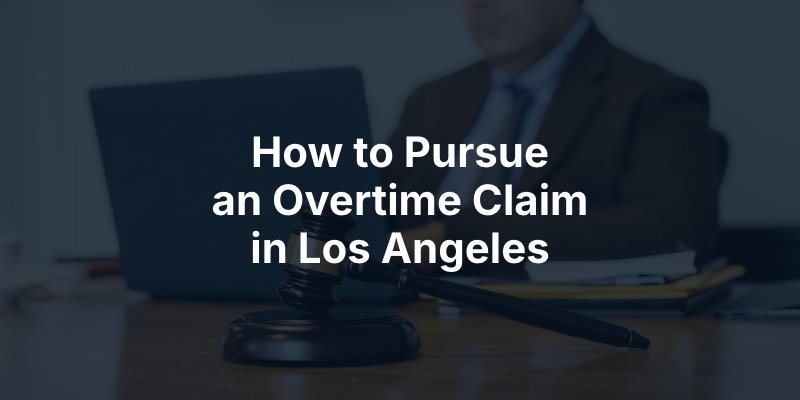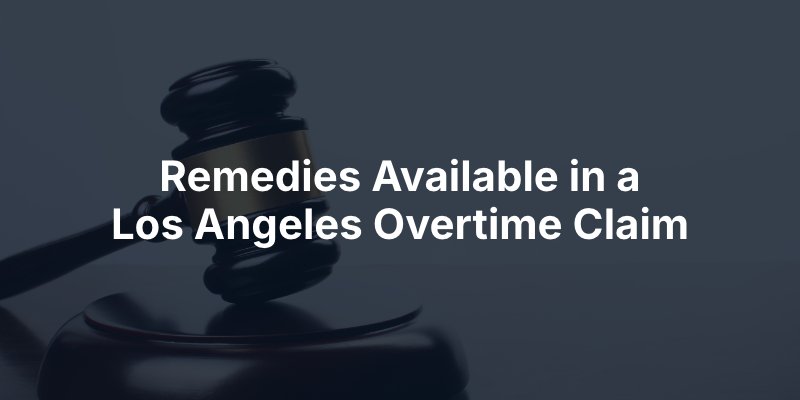If you believe you are owed unpaid overtime wages, you need an experienced Los Angeles wage and hour attorneys on your side. At Aegis Law, we specialize in helping employees recover the compensation they deserve for overtime work. Call (949) 379-6250 or message us online to arrange a free and confidential consultation today.

Founded in 2003, Aegis Law Firm has emerged as a prominent labor and employment law firm serving Southern California under the leadership of partners Kashif Haque and Samuel A. Wong. Our team of Los Angeles overtime attorneys are highly regarded litigators, boasting impressive success rates in trials, arbitration, and administrative proceedings.
Our overtime lawyer in Los Angeles can provide invaluable assistance with your case in several ways:
A Los Angeles employment lawyer will assess the facts of your situation to determine if you have a valid claim for unpaid overtime wages. They will review your employment records, pay stubs, and work schedule to determine if your employer has violated state or federal overtime laws.
Your unpaid overtime lawyer in Los Angeles will explain your rights under overtime laws, including the minimum wage, overtime pay rates, and exemptions. They will ensure you understand your legal options and the potential outcomes of pursuing a claim.
Your lawyer will conduct a thorough investigation into your employer’s payroll practices and timekeeping records to gather evidence of any overtime violations. This may involve interviewing witnesses, obtaining documents, and analyzing relevant data.
Your lawyer will represent you in negotiations with your employer to seek a fair settlement for your unpaid overtime wages. They will advocate on your behalf and use their legal expertise to secure the maximum compensation you’re entitled to.
If negotiations fail to resolve the dispute, your lawyer will represent you in legal proceedings, including filing a lawsuit in court. They will prepare and file all necessary legal documents, represent you in court hearings, and argue your case before a judge or jury.
Your lawyer will ensure your rights are protected against any retaliation from your employer for asserting your right to overtime pay. They will take legal action if you experience retaliation, such as termination or demotion.
Overall, an employment lawyer will provide you with skilled legal representation and guidance throughout the entire process, working tirelessly to ensure you receive the overtime wages you’re owed under the law.
Federal and state overtime pay laws are designed to protect workers by ensuring they are fairly compensated for working additional hours beyond standard workweek limits. Here’s an overview of the key provisions:

Under federal law (Fair Labor Standards Act – FLSA), non-exempt employees are entitled to overtime pay at a rate of at least one and a half times their regular rate of pay for hours worked over 40 in a workweek.
In California, non-exempt employees are entitled to overtime pay for:
Overtime pay must be calculated at a rate of one and a half times the employee’s regular rate of pay for each overtime hour worked under federal law.
In California, overtime pay is calculated as follows:
Employers often violate California overtime laws, sometimes intentionally and sometimes due to ignorance. Common violations include:
These actions can result in significant underpayment.
Independent contractors do not qualify for overtime pay under California law because they are not considered “employees.” However, many overtime employment claims arise from the misclassification of employees as independent contractors. Employers often use this classification to avoid paying overtime, providing benefits, or covering payroll taxes.
Under California’s Assembly Bill 5 (AB 5) and subsequent legislation, most workers are presumed to be employees unless the employer can satisfy all three parts of the ABC test:
If the hiring entity cannot prove all three elements, the worker must be classified as an employee and is therefore entitled to overtime pay, among other legal protections.
When a business misclassifies an employee as an independent contractor, the employee is entitled to the following legal remedies:
Employees who believe they have been misclassified can file a wage claim with the California Labor Commissioner or pursue a private lawsuit. Courts and agencies will examine the nature of the working relationship—not just the terms of the contract.
Employees in Los Angeles who have not received proper overtime pay can either file a wage claim with the California Division of Labor Standards Enforcement (DLSE) headed by the California Labor Commissioner’s Office or pursue a civil lawsuit. Here are the steps to take:

To qualify, you must be a non-exempt employee and have worked:
You must also show that your employer failed to pay the correct overtime rate.
You will need supporting evidence, such as:
Employers must keep payroll records for at least three years. If those records are unavailable, your own documentation and testimony may be used.
If you feel safe doing so, you may consider notifying your employer or HR department about the issue. In some cases, the missing overtime is the result of an error or misunderstanding that can be resolved internally. However, you are not required to raise the issue with your employer before filing a claim.
Consulting with a Los Angeles overtime attorney can help you:
Most employment lawyers offer free consultations and work on a contingency fee basis, meaning you pay nothing upfront.
To file a wage claim:
Once filed, the process includes:
If the employer fails to pay, the ODA can be enforced as a court judgment.
An employee may also file a lawsuit in Los Angeles County Superior Court. Civil claims are appropriate when:
The statute of limitations sets the deadline for how long you have to file a lawsuit. If you miss it, you will lose out on the opportunity to recover compensation.
California law prohibits employers from retaliating against employees for asserting their wage rights. Retaliation may include termination, demotion, or reduced hours. Employees who face retaliation may file a separate claim with the DLSE or include retaliation in their lawsuit. Potential remedies include reinstatement, back pay, and civil penalties.
If multiple employees are affected by similar overtime violations, they may file a class action lawsuit. This approach is common in large companies where illegal policies or practices affect groups of employees. Class actions increase efficiency and deter employers from systemic violations.
Alternatively, employees may file a Private Attorneys General Act (PAGA) representative action, seeking civil penalties on behalf of themselves and other employees. In these actions, the employee acts as a “private attorney general.” As a result, 75 percent of penalties go to the state, and 25 percent to the aggrieved employees.
Employees who win an overtime claim in California may recover more than just unpaid wages. The law provides several remedies to ensure full compensation and deter employer misconduct:

Employees are entitled to all overtime earned, including:
Unpaid wages accrue 10% annual interest from the date they were due.
If final wages were not paid at termination, employees may receive up to 30 days’ pay under Labor Code § 203.
Prevailing employees may recover reasonable attorney’s fees and court costs.
Under the Private Attorneys General Act, employees may collect civil penalties for Labor Code violations:
For certain claims involving minimum wage violations, employees may recover an amount equal to the unpaid wages.
If the employer retaliated, additional remedies may include:
These remedies apply whether the claim is filed through the DLSE, a civil court, or a PAGA action.
There are certain categories of employees who may be exempt from overtime pay requirements under both federal and state laws. These exemptions are typically based on the nature of the employee’s job duties, salary level, and sometimes other factors. Here are some common exemptions:
This category includes employees whose primary duties involve:
Employees whose primary duties involve office or non-manual work directly related to management or general business operations and require the exercise of discretion and independent judgment with respect to matters of significance.
This exemption applies to employees in learned professions (such as lawyers, doctors, and teachers) or creative professionals (such as actors, musicians, and writers) whose primary duties involve work that requires advanced knowledge or creativity and is predominantly intellectual and varied in nature.
Employees whose primary duties consist of computer systems analysis, programming, software engineering, or similar skilled work and who are paid at least a certain minimum salary level.
Employees who regularly work away from the employer’s place of business making sales or obtaining orders or contracts for services or facilities.
It’s important to note that these exemptions have specific criteria that must be met, and simply having a job title or being paid a salary does not automatically make an employee exempt from overtime.
Don’t let your employer deny you the overtime pay you have rightfully earned. Contact our Los Angeles overtime lawyers today to schedule a free consultation and take the first step toward recovering the compensation you deserve.